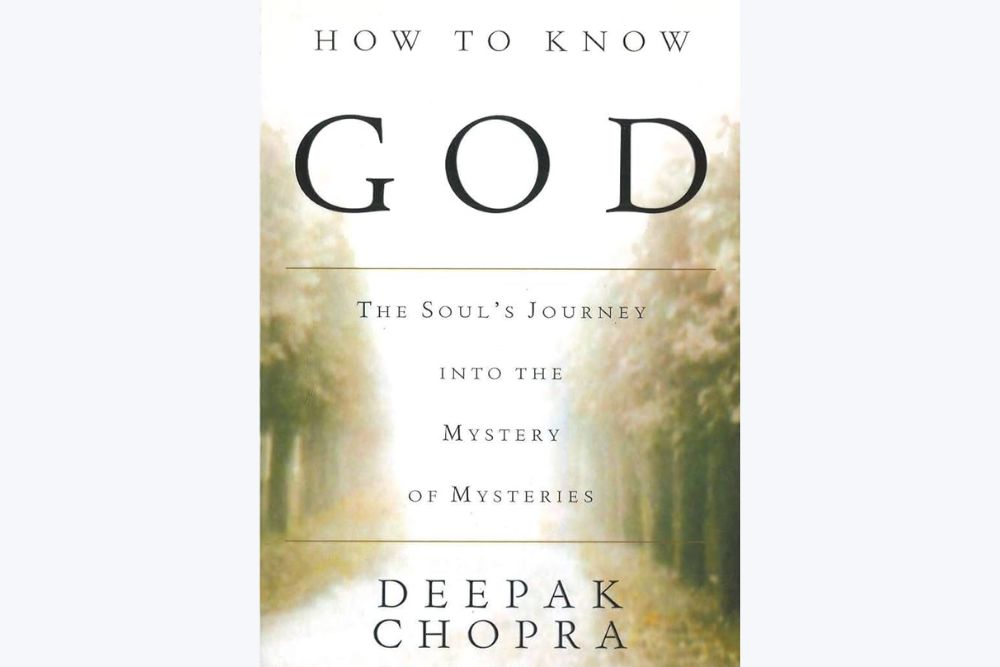A Review of How to Know God – The Soul’s Journey into the Mystery of Mysteries by Dr. Deepak Chopra.
Review by K. Darbey
Have you ever wondered, as I have, why two people, each affirming that they are on a spiritual path, do not always seem to have an affinity – nor sometimes even an appreciative empathy – with each other’s core ideas, beliefs and points of view?
Why does a specific activity or line of enquiry fascinating and vital to the inner development of one seem like irrelevant pie in the sky or pointless rhetoric to the other?
Why, for example, a Wiccan ceremony to connect with the eternal nature of the seasons may be sublime communion to one soul, yet some must navigate that door to eternity by contemplating the true nature of the Universe, avidly digesting the supporting scientific data? (Is Dr Michio Kaku correct that there are ten dimensions? Are there more?)
Why does the timbre and rhythm of The Great Bell Chant of the Buddhists provide that same touch of the infinite for another?
The Many Paths to the Divine
You may see my point by now: brothers and sisters under the skin we might be, but our spiritual vocations and pursuits can vary enormously. And do.
It does not seem enough simply to say that an outlook may be culture-specific, although certainly that may play a major part in shaping a seeker’s journey. Many today draw upon the traditions of more than one strand of their ancestral heritage to build a highly individual trajectory of inner evolution.
Perhaps it could be legitimately said that there are as many potential modes of spiritual expression as there are people on the planet, and surely it is unsurprising that our views of our Creator may be accordingly diverse.
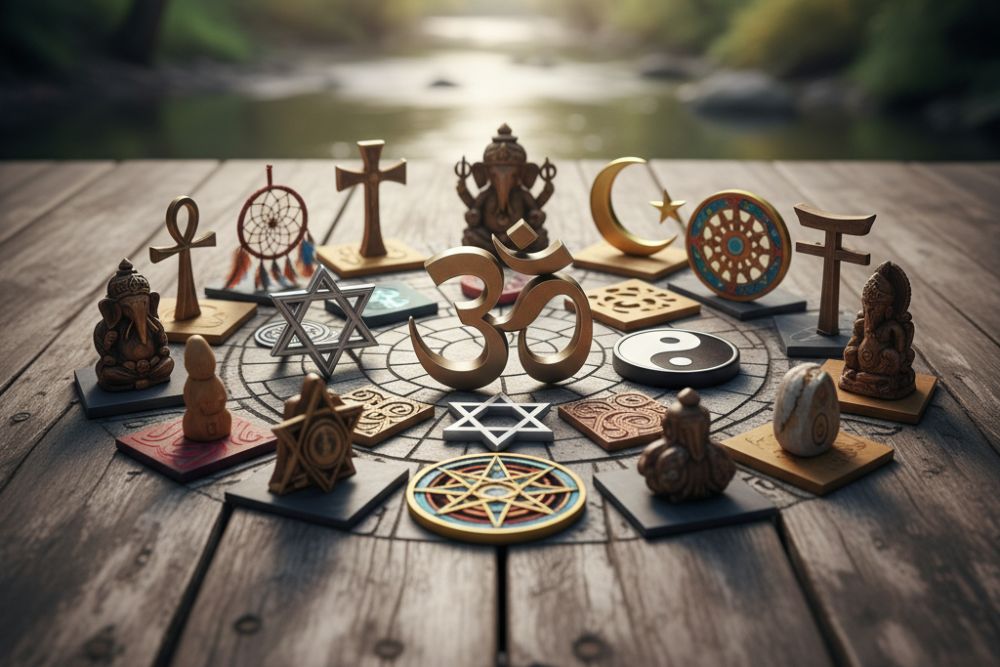
This phenomenon is scrutinised methodically by Dr Deepak Chopra in his groundbreaking book How to Know God: The Soul’s Journey into the Mystery of Mysteries. It makes for an eagle’s eye view of how a spiral of projection and reflection interweave to form necessarily subjective answers to the questions we can never, as enquiring and self-determining human beings, put aside for too long.
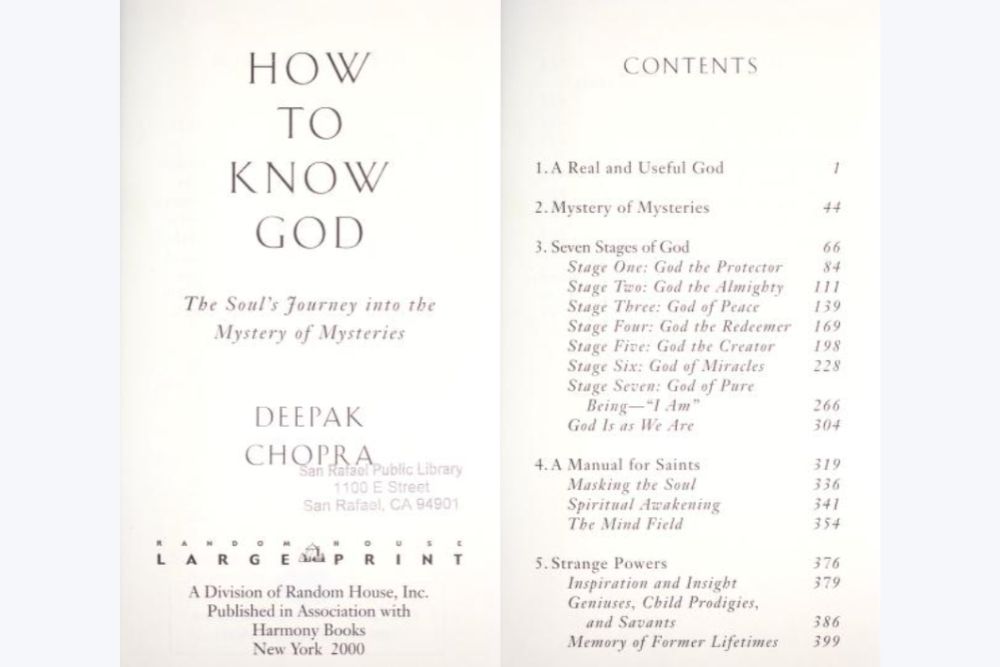
How to Know God book review
Order over Chaos: The Psychological Need
To satisfy our deepest psychological need as human beings, order must prevail over chaos when qualifying the cosmos and our place within it, Dr Chopra emphasises. The implications of this are shown to be axiomatic to our development.
Driving evolution of the human species, our brains and nervous systems are programmed to act as an interface to allow us to interpret our developing notions of who we are, how we got here and why we are living an earthly life – and our grasp and perceptions of the mysterious unseen power that makes it all possible.
Obeying this imperative for order, the character of the God we recognise is born from whichever point at which we stand in our own personal evolution.
Our concept of God is inescapably a reflection of our own individual consciousness.
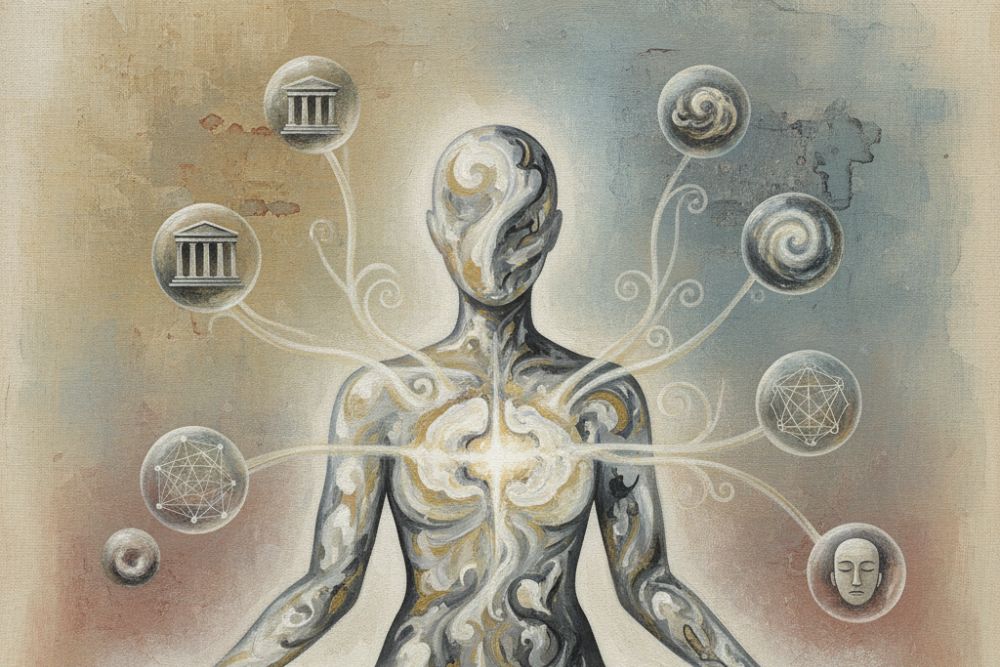
How to Know God book review
The frame of reference within that consciousness takes its structure from one of the seven levels of embedded sociobiological human response. Ranging from fight-or-flight through to sacred response, they give rise to seven different archetypes, from God as powerful protector to a God of pure being.
Whichever we experience, we have invited the deity we feel most mentally and emotionally able to assimilate to accompany us through our earthly lifespan.
God the protector fits a world of bare survival, full of physical threats and danger.
God the almighty fits a world of power struggles and ambition, where fierce competition rules.
A God of peace fits a world of inner solitude where reflection and contemplation are possible.
God the redeemer fits a world where personal growth is encouraged and insights prove fruitful.
God the creator fits a world that is constantly renewing itself, where innovation and discovery are valued.
A God of miracles fits a world that contains prophets and seers, where spiritual vision is nurtured.
A God of pure being—“I Am”—fits a world that transcends all boundaries, a world of infinite possibilities.
The wonder is that the human nervous system can operate on so many planes.
Deepak Chopra, ‘How to Know God: The Soul’s Journey Into the Mystery of Mysteries’
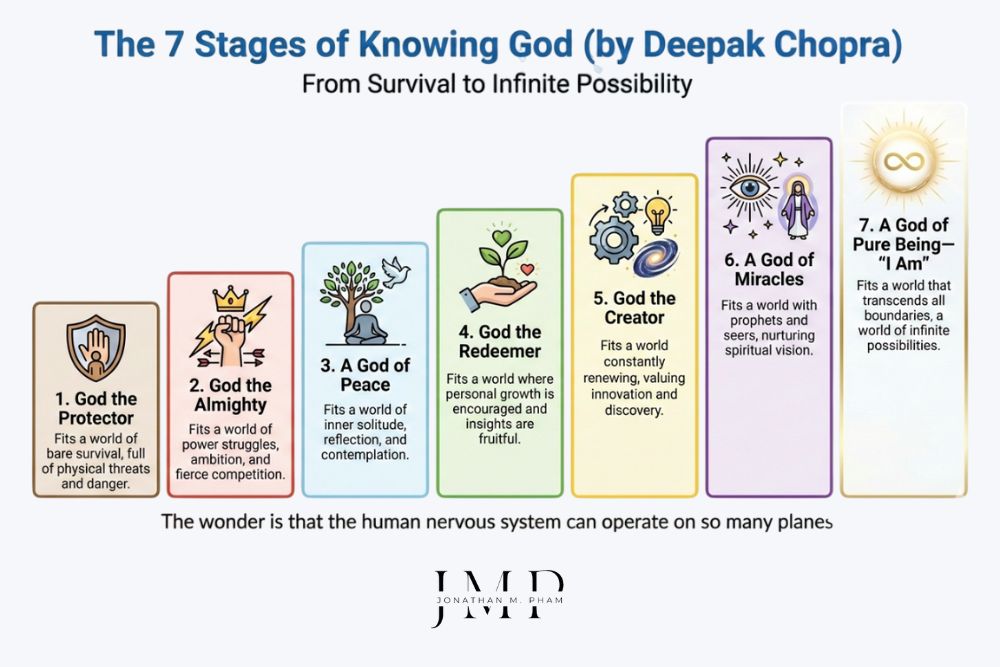
Self-Evaluation and The Reflection of Reality
Commonsense and direct though this observation may seem, when taken to heart, I found the implications reverberated resoundingly, calling for much self-evaluation.
Suddenly, every iota of speech and action was revealed as a building block of a personal reality under daily construction. Small wonder it has been said that thought control is the highest form of prayer.
Further, there was more compassion for the motivations of others.
- Why was that person so caught up in the intricacies of arcane literature?
- Why was that person so incensed by an unusually broad interpretation of church protocol?
- Why did that person insist that timing was everything?
The common denominators were commitment to the journey and an unshakeable personal conviction: because these things were simply as important to them as breathing, given their individual worldviews.

How to Know God book review
A Multilayered Reality
Since it surely behoves us to examine the nuances and reflections of these realisations as our lives unfold, “To which God have I given my allegiance?” becomes the question that may pull us closer toward the soul than any other.
If we are to explore the panoramic field of vision necessary to consider the full range of possibilities, Dr Chopra clarifies that we need to go further and consider reality through a multilayered model:
- Physical Reality: What we experience with our senses.
- Quantum Reality: The transition realm where energy prepares to convert into form.
- Virtual Reality: The realm beyond physical and quantum reality, where time and space are meaningless – the original source.
From this expanded observation point, the supramundane perceptions characterising the later levels of human response in the arc make perfect sense. No longer can we question the validity of others’ realities just because we cannot yet see into them.
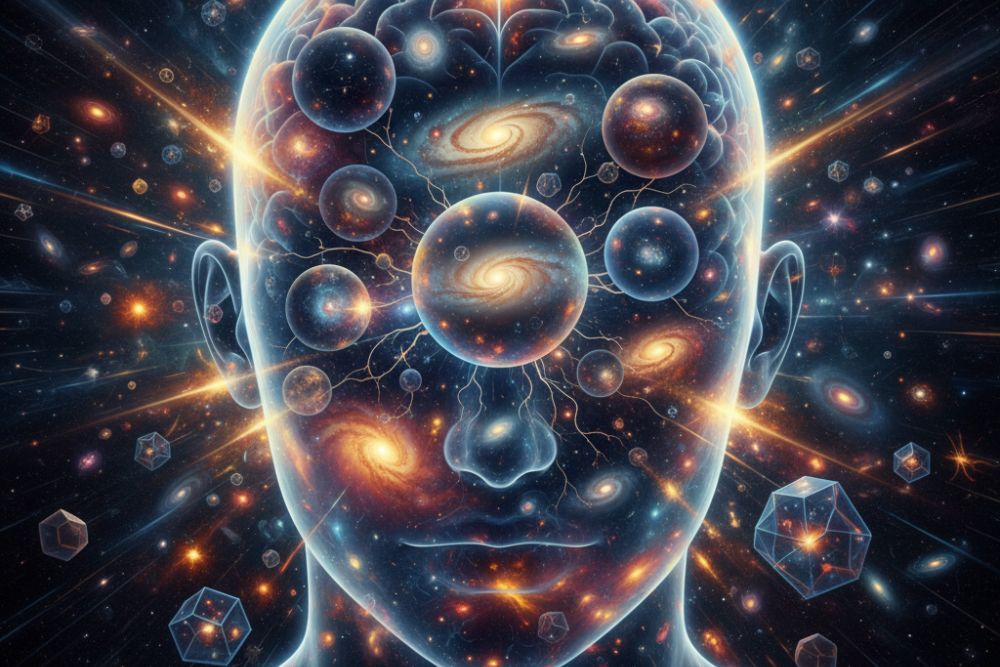
How to Know God book review
The Map of the Soul: Jiva and Atman
As if Dr Chopra’s painstaking stage-by-stage map of the strengths, hurdles, and God-views were not life-changing riches enough, there is yet more to this work that brings sharper focus where the edges of our ideology may have been blurred.
Speaking of the ancient Vedas, Dr Chopra brings to our attention a description of the soul not so widely encountered in the Western world. Its true nature, he suggests, is dual:
- Jiva: The aspect which traverses many lifetimes until it achieves full realisation of God.
- Atman: The pure, unchanged and unchanging spirit that is made of God’s own essence and never leaves the Godhead since it is a part of it, universal and timeless.
The paradox leapt out of the text for me at this point. All our striving, our efforts, through the illusion of time and space, are to help us simply remember ourselves as we really are.
Refusing to identify with our temporal selves, we can dive much deeper to reach our spiritual roots and define ourselves as a facet of the eternal.

How to Know God book review
Confronting the Ego with Compassion
I will be honest: it has taken me a decade to come to my current level of appreciation for this unique offering Dr Chopra has sent out into the world.
Its truths have not always been easy to digest. My vanity has suffered badly at times when I have recognised myself acting not as the enlightened being I could aspire to become, but as an outworking of my own ego.
However, in contrast to the schools of thought advocating that we do battle with the ego, the author employs a gentle approach.
By placing our attention onto what is real, we are able to watch the smaller self taking its illusions very seriously and simply remind it to put some balancing measures in place. We become like the wise parent monitoring the development of the small child.
If we catch ourselves slipping, momentarily allowing a response from a place of fear, we have only to remind ourselves that we prefer the responses we have embraced from a place of peace.

How to Know God book review
Final Thoughts: The Power of Intention
As Dr Chopra reminds us, there is never a point at which soul work ends. We are here not to become a “finished product” but rather to see what our soul promptings are pushing us to explore.
From an authentic state of union, perhaps nothing is impossible.
Asked why we should strive to know God, my answer would be selfish: I want to be a creator. This is the ultimate promise of spirituality, that you can become the author of your own existence, the maker of personal destiny. Your brain is already performing this service for you unconsciously.
Deepak Chopra, ‘How to Know God: The Soul’s Journey Into the Mystery of Mysteries’
I cannot close without pointing out that a more powerful validation than anything I could say here comes from the simple congratulatory message to Dr Chopra printed on the cover of the book. Ten years ago, it drew me in like a magnet. Those supportive words act like a shining thread leading the way out of a maze.
They belong to none other than His Holiness The Dalai Lama.

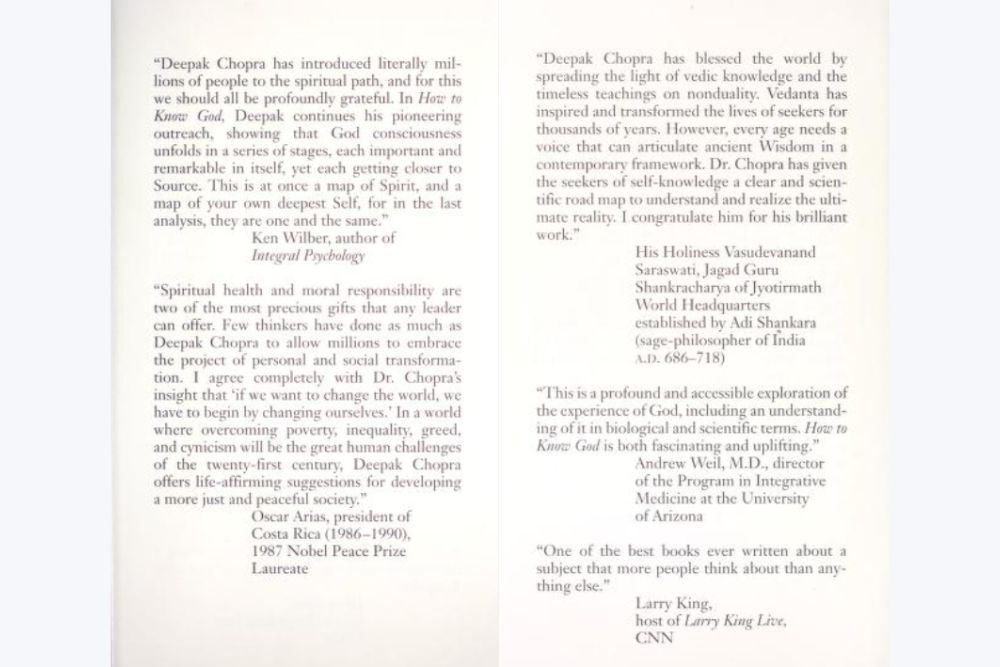
Other resources you might be interested in:
- The Secret Life of Water (by Masaru Emoto) Book Review
- 25 Best Spiritual Books to Read by Theme: A List for Every Seeker
- Meaning of Life Books: 15 Enlightening Reads to Illuminate Your Purpose
- 20 Best Self-discovery Books: Journey Within to Find Your North Star
- 60 Existential Questions: A Daily Toolkit to Explore Life’s Depths
Let’s Tread the Path Together, Shall We?

